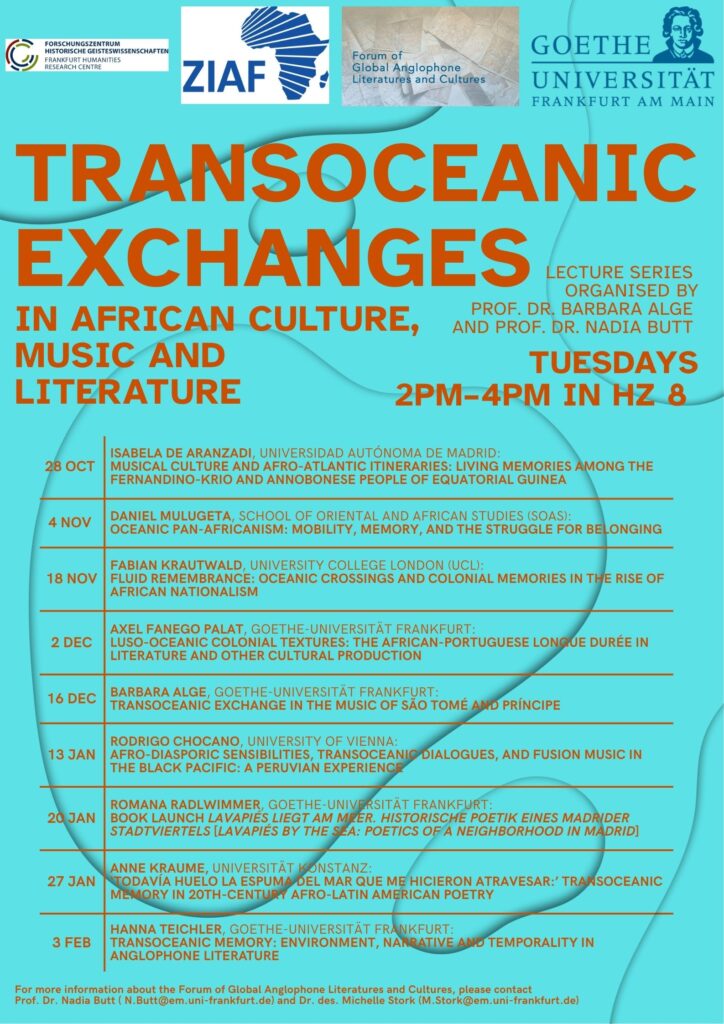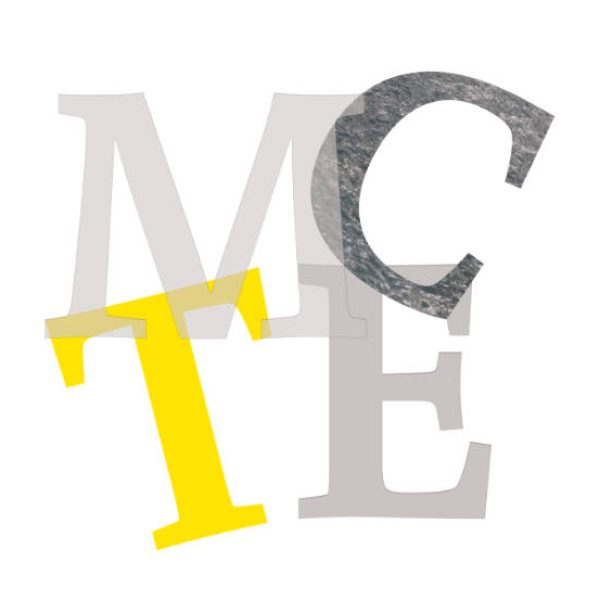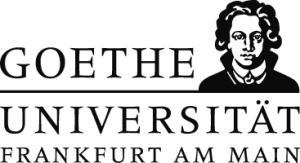Moving Cultures, Transcultural Encounters
// Moving Cultures – Transcultural Encounters // Culturas en movimiento – encuentros transculturales // Cultures en mouvement – rencontres transculturelles // Culture in Movimento – Incontri Transculturali // Moving Cultures – Transcultural Encounters // Culturas en movimiento – encuentros transculturales // Cultures en mouvement – rencontres transculturelles // Culture in Movimento – Incontri Transculturali //
Search
News
-
Guest Lecture: Migration in Digital Memory: Navigating Identities, Narratives, and Politics09 Feb 2026 Events
-
Decolonial Mourning and Political Memory Work–Thinking through (Dis-)compassion and towards a Caring Commons30 Jan 2026 Events
-
Hanna Teichler (Frankfurt): “Transoceanic Memory. Environment, Narrative and Temporality in Anglophone Literature” | Transoceanic Exchanges15 Oct 2025 Events
-
Anne Kraume (Constance): “‘Todavía huelo la espuma del mar que me hicieron atravesar.’ Transoceanic Memory in 20th-Century Afro-Latin American Poetry” | Transoceanic Exchanges15 Oct 2025 Events
-
Romana Radlwimmer (Frankfurt): “Book Launch Lavapiés liegt am Meer. Historische Poetik eines Madrider Stadtviertels [Lavapiés by the Sea. Poetics of a neighborhood in Madrid]” | Transoceanic Exchanges15 Oct 2025 Events
Contact
Dr. Pavan Malreddy / Prof. Dr. Frank Schulze-Engler
Department of English and American Studies
Norbert-Wollheim-Platz 1
D-60629 Frankfurt am Main
To make an appointment:
Phone: 069/798-32352
Email: c.argast@em.uni-frankfurt.de
Prof. Dr. Jacopo Torregrossa
Department of Romance Languages and Literatures
Norbert-Wollheim-Platz 1
D-60629 Frankfurt am Main
To make an appointment:
Phone: 069/798-32021
Email: salerno-petersen@em.uni-frankfurt.de
Selected Tuesdays in winter semester 2025/26, 2pm-4pm CET
Campus Westend, Hörsaalzentrum, room HZ 8
Co-organised by Prof. Dr. Nadia Butt and Prof. Dr. Barbara Alge, funded by ZIAF.

The lecture series is part of the Forum of Global Anglophone Literatures and Cultures
In the last years, oceans have become important spaces of academic inquiry beyond the limitations of nation and questions of nationalism. They are approached as sites of cross-cultural encounters as much as landscapes of colonial and postcolonial transactions (Steinberg 2001; Alge 2013; Ferdinand 2022; Kraume 2023; Radlwimmer 2024) and contact zones (Pratt 1992). Édouard Glissant theorised oceans as a place in flux to underline their uniqueness beyond the geographical and territorial confines of the state (1996). Under the claim of an “oceanic turn in the humanities” (DeLoughrey 2016), offshoots of the ocean such as lagoons, lakes, seas, or archipelagos are also increasingly examined as significant objects, involving humans and non-human agents for scholars of ecologies, ecocriticism, blue humanities, Anthropocene, or postcolonial environment studies. In fact, the ocean historically and metaphorically has always been a potent symbol of people and commodities as well as history and memory (Gilroy 1993; Walcott 1988).
The ocean has intrigued the imagination of cultural and literary scholars and academics across several other disciplines. There is a particular need to more closely interrogate the role of Africa in these debates: Africa’s geographical location is pivotal in transoceanic exchanges as the continent is bounded on the west by the Atlantic Ocean, on the north by the Mediterranean Sea, on the east by the Red Sea and the Indian Ocean, and on the south by the mingling waters of the Atlantic and Indian oceans (Britannica 2024). It therefore becomes a pivotal place in which transoceanic exchanges take place. In his important work The Atlantic Sounds, Caryl Phillips reminds us that the sea “carries Africa on her back like an island” (2001, 160), underlining the role of seas and oceans in the making of histories around and beyond Africa.
Keeping in mind the significance of these encounters and transactions for contemporary culture, music, and literature produced in and about Africa, this lecture series sets out to investigate and explore different dimensions of transoceanic exchanges with African countries from an interdisciplinary perspective. Particularly, the series seeks to delve deeper into the notion of transoceanic belongings (Kabir 2021), transoceanic entanglements (Teichler 2022), transoceanic imagination (2022 Wöll), to name but a few, from diverse perspectives. The prime objective of the series is to bring speakers from various fields of study to Goethe University to share their expertise in the form of a lecture. Not only does the series engage with transoceanic crisscrossing, intertwinements or histoire croisée (Zimmermann and Werner 2006) as manifested in the realms of culture, literature, film, music, and several other media, but it also approaches it as a space of trials and tribulations as well as transcultural transgressions and transformations.
Programme with detailed information:


